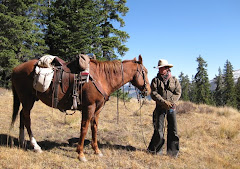 And where do we go from here?
And where do we go from here?Tom Dorrance is often quoted as having said, “Listen to the horse. Try to find out what the horse is trying to tell you.”
But I’d like to know, how do we know what the horse is telling us until we learn to speak their language? I suppose it is easier for those born into the world of horses. That’s a great place to begin. However, for those who were not, those that sought horses on their own, and even (oh my!) not until adulthood, learning the language is more difficult. Just like learning a second language, it is of course possible, but how much easier when we are raised in a bi-lingual household!
That, my friend, is what makes a good teacher. One who can point out not only what the horse is saying, for those of us uncertain of the language, but also explain the language to us. Translate, if you please. And in time, we thus can learn to understand what the horse is saying.
It's not a matter of whispering. It's just learning to talk the horse's language. Our goal is to learn the language.
As Wendy Murdoch points out in her book, “Simplify Your Riding” (copyright 2004 by Wendy Murdoch), “The adage ‘the horse is your teacher’ is only useful if you understand what the horse is teaching. It is difficult to ‘let the horse teach you’ if you don’t know what the lesson is.”
I’m also pretty interested in Wendy’s point of view on “modern methods” of teaching in which the student/teacher/horse interact in a positive manner to achieve positive results, as opposed to “traditional methods of teaching people how to ride (which) include repetition, exhaustion, negative reinforcement, and domination…Yelling and screaming at students only drives them further into the undesirable pattern because when stressed we simply react, we don’t learn.”
I’d like to learn. I’ll choose my teachers accordingly.
As Wendy Murdoch points out in her book, “Simplify Your Riding” (copyright 2004 by Wendy Murdoch), “The adage ‘the horse is your teacher’ is only useful if you understand what the horse is teaching. It is difficult to ‘let the horse teach you’ if you don’t know what the lesson is.”
I’m also pretty interested in Wendy’s point of view on “modern methods” of teaching in which the student/teacher/horse interact in a positive manner to achieve positive results, as opposed to “traditional methods of teaching people how to ride (which) include repetition, exhaustion, negative reinforcement, and domination…Yelling and screaming at students only drives them further into the undesirable pattern because when stressed we simply react, we don’t learn.”
I’d like to learn. I’ll choose my teachers accordingly.
Likewise, when I’m here to teach, I am learning to be a better teacher using the positive reinforcement, striving to increase both knowledge and confidence in my riders, and hopefully enjoying the process together!
Bill Dorrance stated with great importance in a special addition to his book, “True Horsemanship Through Feel” (copyright 2007 and 1999 by Bill Dorrance and Leslie Desmond), “Horsemanship through feel is handed down from one friend to another.”
I’m looking for that friend. A good teacher should be that friend, or at least, assume the role of “friend” when working with you, teaching you the horses’ language that he or she may already have figured out (or, more than likely, been taught) pretty well.
Finding that teacher, or friend, is not as easy as I had hoped...
I intend to always be learning, to always be open to new ideas, and by golly, I’ll be one lucky lady if I can keep up with working with my horses long enough to accomplish half the goals I hope to achieve in terms of horsemanship.
I will never live long enough to do it all, master all, and certainly not know it all. I know of no one who has lived that long. What I can do is enjoy learning and continue trying. What more can we each ask for?
Time to get off my high horse…
I end with a quote I read recently, though I do not know its source:
"If you always do what you always did, you'll always get what you always got."





